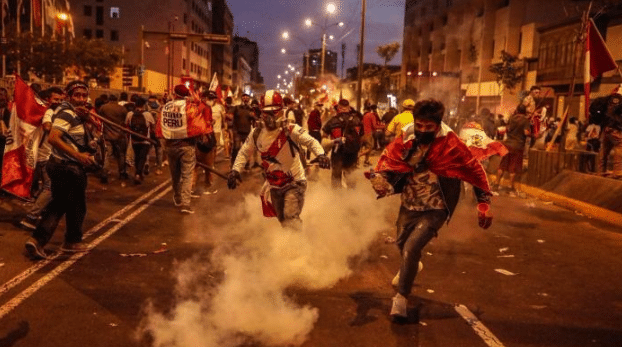For writer, university professor, former foreign minister of Peru from July to August 2021, Héctor Béjar Rivera, during the government of Pedro Castillo, the mobilizations in his country have their origin in the indignation and discrimination against his people.
“The Peruvian Republic has flaws of origin,” he wrote to Granma newspapers.
When it was founded, the 20,000 black slaves, many of whom had fought as soldiers in the liberating armies of San Martin and Bolivar, were not incorporated to the citizenship; nor the indigenous guerrillas; nor the indigenous people who were 90% of the population, and who had led countless uprisings against colonialism; nor the youth, because it was established that one was a citizen from the age of 24; nor the women.
The first constituent Congress of 1822 was formed only by Catholic priests, soldiers and lawyers. The Peruvian Republic was born handicapped, socially weak, blind to social reality and deaf to popular claims, which were always answered with repression, massacres and persecution.
With minor alterations and expansions, this situation was maintained throughout 200 years of Republic, and has made crisis.
It was accepted, successively, that illiterate people, women, young people from 18 years old vote, but never an indigenous, Andean, black or Amazonian native became a representative in the Congress of the Republic. Democracy was monopolized by the parties of the oligarchy or the urban middle classes.
The decadence and corruption of this system, which is already exhausted, has caused the general uprising of social organizations of different types: peasant patrols in the north of the country, Quechua and Aymara communities in the south, merchants in the popular markets, transporters, university students, teachers, thousands of people, men, women of all ages who have self-convened, surpassing, by far, the initiative of the parties of the left.
The basis of this very broad movement works from the resolutions of communities and collective organizations of different types, which do not have or accept the classic leaders of traditional politics.
As is known, the trigger for the current popular explosion was the abusive and illegal removal of President Pedro Castillo by the extreme right-wing groups that have captured the Congress. The indignation explodes even more when the government of (Dina) Boluarte has responded to the protests by mobilizing the Army, which has killed more than 60 people, firing tear gas bombs and war bullets into their bodies.
- In the face of the hegemony of the United States, how do you assess the correlation of forces in the continent?
- There is no correlation of forces favorable to the peoples of Latin America and the Caribbean in the face of the hegemony of the United States, which keeps Cuba and Venezuela blockaded and conspires against Nicaragua.
Simón Bolívar’s will for integration was not continued. Governments have followed the individual state behavior that has been characteristic of our subcontinent since the failure of the Panama Conference of 1826.
It is necessary to accelerate the partial integration processes of the Andean Community of Nations, MERCOSUR, UNASUR, CELAC, and other instances that link us as a supranational identity different from the United States and Canada.
- What can the processes in Cuba, Venezuela, Bolivia and Nicaragua mean in this Latin American context?
- The information on these four countries is hidden or distorted by the media, which are in the hands of reactionary monopolies. The Cold War politics, which divides the world into good guys and bad guys, has returned.
However, in spite of this journalistic and informative blockade, broad popular and youth sectors maintain sympathy, solidarity and adhesion with these revolutionary processes, which mean lessons to learn in the course of the struggle for a system different from the corrupt and savage capitalism that reigns.
The figures of Fidel, Che, Allende and many other revolutionary leaders and martyrs constitute today icons and examples that broad popular sectors of Latin American nations follow.
Translated by ESTI

